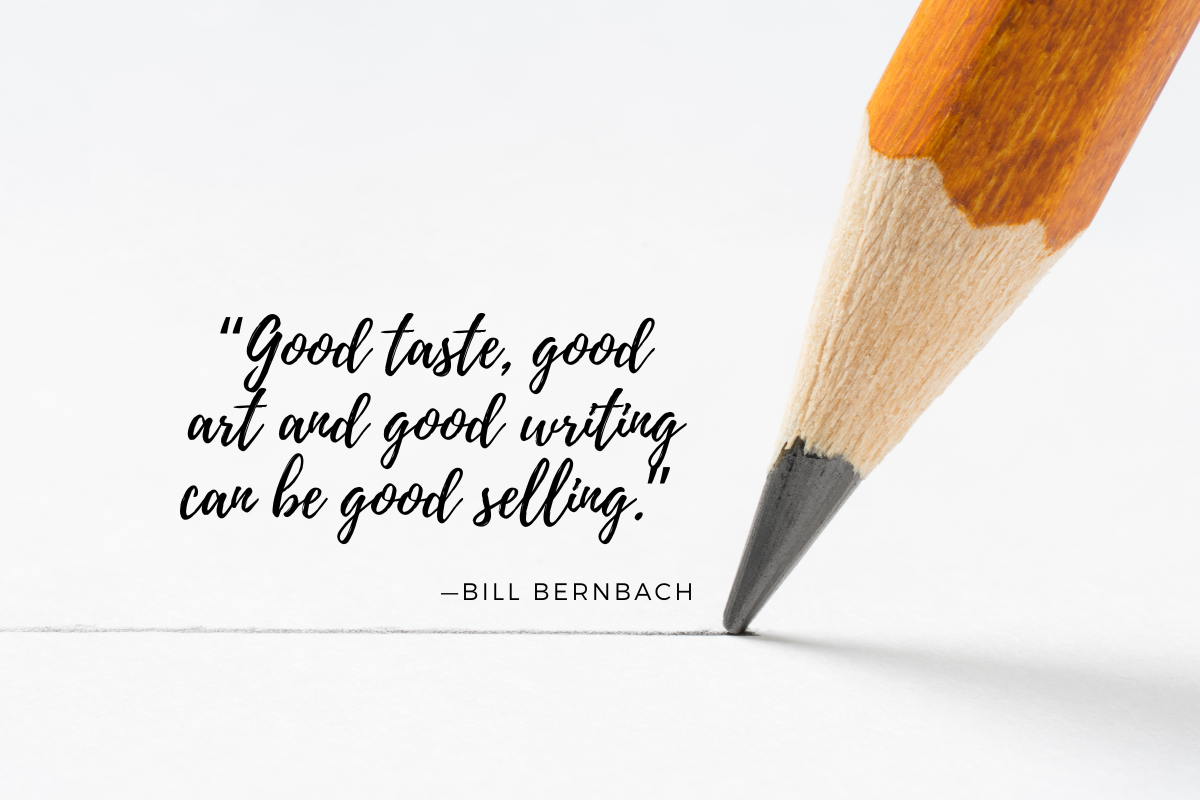Obituaries for traditional advertising have been pouring in for the longest time. As bigger and bigger chunks of ad spends are allotted to digital platforms, the death knell for print ads and TV and radio commercials continue to ring. Some however are quick to argue that traditional advertising is simply evolving into today’s digital and social media content.
Whichever side of the debate you’re on, one thing no one can deny is that the time-honored principles of creativity sired during the 1950s Creative Revolution is still alive and kicking. DDB’s “Think Small” for Volkswagen is still hailed as the GOAT ad. And Apple’s “1984” by Chiat/Day hasn’t been dislodged as the best TV commercial ever.
So, what makes these classic ads, well, classic? What separates great advertising from the merely good? To answer these questions, let’s hear it from the advertising legends, the real Mad Men whose brand of creativity still works for today’s TikTok generation.

BILL BERNBACH: CREATIVITY SELLS
Bill Bernbach was a legendary figure in the advertising industry and the co-founder of Doyle Dane Bernbach (DDB). Known for his belief in the power of simplicity and emotional connection, Bernbach revolutionized advertising by creating iconic campaigns such as Volkswagen’s “Think Small” and Avis’s “We Try Harder.” His innovative and human-centric approach continues to inspire marketers around the world.
“Good taste, good art and good writing can be good selling.”
Bernbach always preached that quality and creativity are essential elements in successful advertising. By emphasizing aesthetics, artistic expression, and effective storytelling, ads can engage and resonate with audiences on a deeper level. When advertising is crafted with care, attention to detail, and a focus on delivering a compelling message, it has the potential to not only sell products or services but also leave a lasting impact on consumers. This Bernbachian principle has been the driving force that continues to elevate advertising to a higher level, creating a memorable and influential brand experience.
DAVID OGILVY: RESPECT YOUR AUDIENCE
David Ogilvy, often referred to as the “Father of Advertising,” was a British advertising tycoon and founder of Ogilvy & Mather. Renowned for his elegant and persuasive writing style, Ogilvy believed in the importance of research, strategy, and creative excellence. He crafted iconic campaigns for brands like Dove, Rolls-Royce, and Hathaway, and his book “Confessions of an Advertising Man” remains a must-read for aspiring marketers.
“The consumer isn’t a moron; she is your wife.”
Ogilvy emphasized the importance of treating consumers with respect and understanding. Instead of underestimating their intelligence or assuming they lack knowledge, advertisers should approach consumers as intelligent individuals who make informed decisions. By recognizing the intelligence and humanity of consumers, advertisers can create meaningful connections and foster long-lasting relationships based on trust and mutual understanding.
LEE CLOW: BE BOLD. BE BRAVE.
Lee Clow is a renowned advertising executive who left an indelible mark on the industry. Best known for his work with Apple, he spearheaded the iconic “1984” commercial and the “Think Different” campaign that defined the brand. Clow’s innovative and rebellious approach to advertising earned him numerous accolades, and his creative leadership continues to influence the industry.
“Most ideas are a bit scary, and if an idea isn’t scary, it’s not an idea at all.”
Ideas worth pursuing are often accompanied by a sense of fear or apprehension because they involve venturing into uncharted territory. These ideas challenge the norm, break through conventional boundaries, and have the potential to disrupt industries or change the way people think. By embracing the scariness of ideas, we acknowledge their potential to push us out of our comfort zones and spark meaningful progress. Clow tells us that the best ideas are born from the willingness to take risks and embrace the unknown, leading to innovation and transformative outcomes.
LEO BURNETT: THE POWER OF SIMPLICITY
The founder of the global advertising agency Leo Burnett Worldwide, Burnett was known for his innovative and creative approach. His belief in understanding consumer motivations and creating campaigns with emotional resonance led to iconic and enduring campaigns for brands such as Marlboro, Kellogg’s, and McDonald’s. Burnett’s philosophy of “creating brand personalities” and his emphasis on storytelling and human connection set a new standard in advertising.
“Make it simple. Make it memorable.”
Leo Burnett taught generations of ad men to emphasize the importance of clarity, creating a lasting impression, visual appeal, and enjoyable reading experience. By adhering to these principles, content can engage and resonate with the audience, leaving a lasting impact while ensuring accessibility and enjoyment.
HOWARD LUCK GOSSAGE: DON’T WRITE ADS
Howard Luck Gossage was an advertising maverick and visionary who frequently challenged traditional advertising conventions and embraced unconventional methods. He believed in engaging audiences through meaningful storytelling and genuine connections. Gossage pioneered the use of direct marketing, guerrilla tactics, and creative stunts to capture attention and provoke conversations. His innovative thinking and unorthodox approach left an indelible mark on the advertising industry, inspiring generations of marketers to think outside the box.
“Nobody reads advertising. People read what interests them; and sometimes it’s an ad.”
A thought-provoking perspective on the nature of advertising and audience engagement, Gossage challenges the notion that people actively seek out and read advertisements, asserting that readers are primarily interested in content that captures their attention and holds their genuine interest. Instead of assuming that consumers are inherently drawn to advertising, Gossage highlights the importance of creating compelling, relevant, and engaging content that resonates with the audience’s interests. By aligning advertising with what captures the readers’ attention, whether it’s an entertaining story, useful information, or a meaningful message, advertisers have a better chance of breaking through the noise and capturing the audience’s interest.
CREATIVITY WILL ALWAYS REMAIN A CLASSIC
There you have it, five tips from five legends of advertising. Though none of them ever created Facebook ads, YouTube explainer videos, Twitter posts, etc., the lesson they impart are still relevant in this age of social media content. Mastering their advice will help today’s creatives — whether in traditional ad agencies or digital content studios — elevate their work from the ordinary and boring to the memorable and persuasive.
